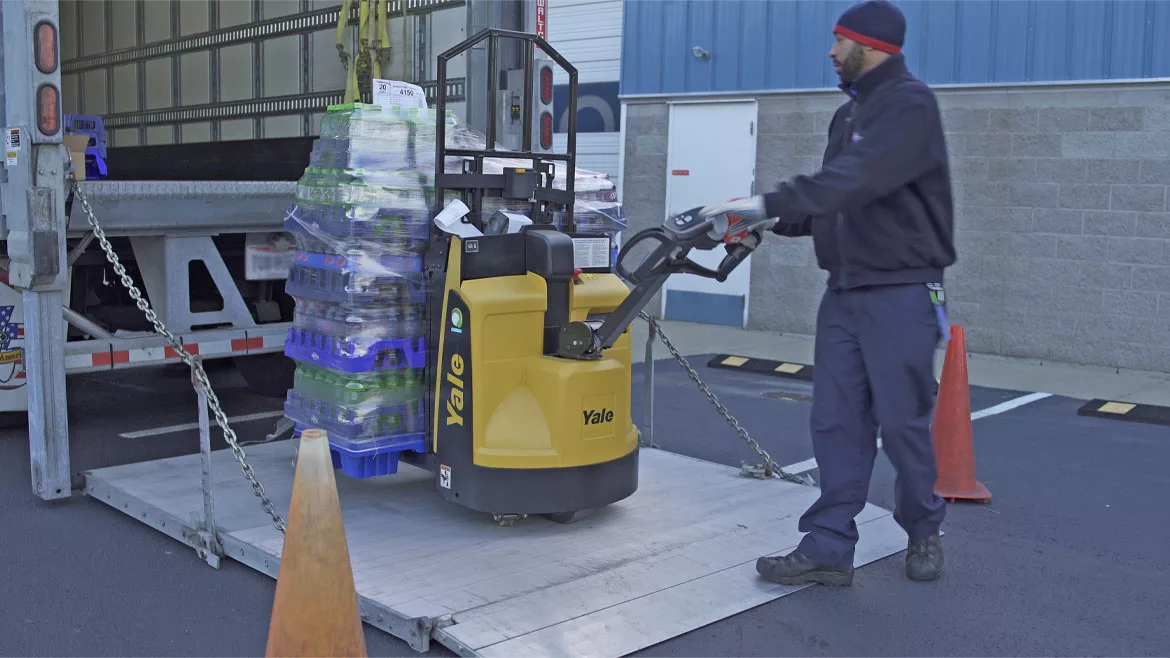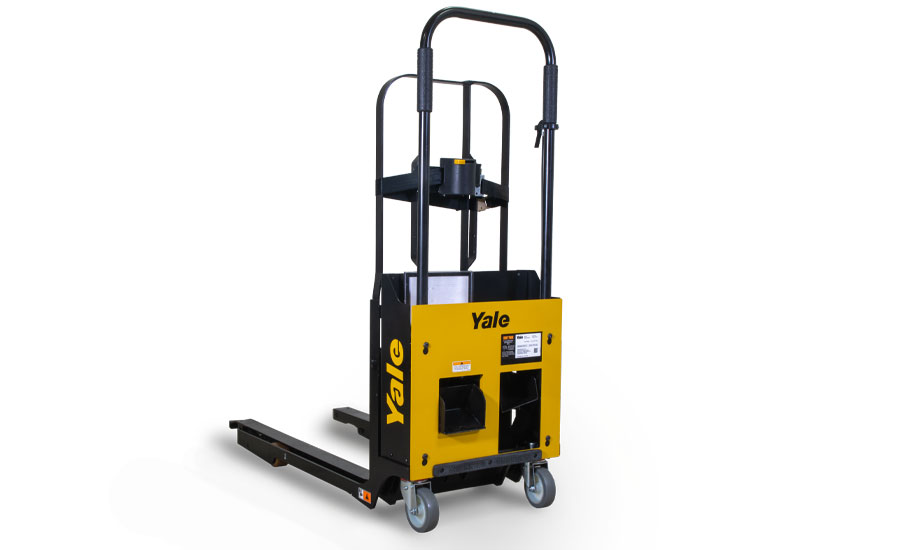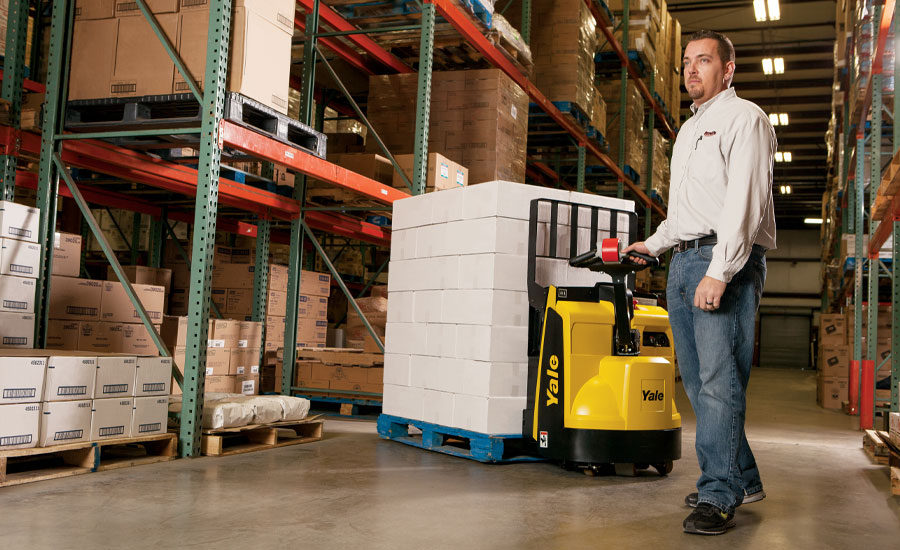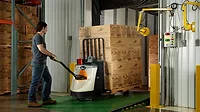Carts, hand trucks design equipment to balance SKU influx
Ergonomics, varied environment keep OEMs innovating

Image courtesy of Yale Lift Truck Technologies
In the animated short “Super Why’s Comic Book Adventures” from the episode “More More Man!” the super readers deal with the fallout of More Man adding a “s” to the end of each word resulting in tons of goats, dogs, boats, etc. To bring things back to normal, Power Paige erases the “s” at the end of the words.
For beverage distributors, handling the influx of SKUs takes a little more than an eraser to manage the amount of products, but carts and hand truck manufacturers are taking a proactive approach to the situation so that delivery personnel can tackle the growing challenge.
“As consumers continue to demand greater beverage selection, more sizes, more quantities and increased convenience, beverage operations are seeking equipment that can handle and deliver this increased SKU load,” says Mike Kennedy, executive business manager and national account manager at Yale Lift Truck Technologies, Greenville, NC. “And for delivery operators, this means more stops along delivery routes, as retailers are requesting more frequent, smaller-quantity deliveries to keep their wide selection of SKUs replenished. These more frequent stops can lead to increased operator fatigue from repetitive motion, and navigating uneven, and sometimes slippery terrain in store parking lots that can bring an increased risk of injury.”

Given these challenges, Kennedy explains that the original equipment manufacturer has committed to navigating the reality of SKU proliferation and frequent stops of today’s beverage delivery world.
“On delivery routes, our DSD sled has a lift table feature to help reduce the wear and tear operator’s face from the increase in repetitive movements caused by SKU proliferation,” he says. “When activated, the sled’s forks will rise so the operator doesn’t have to bend as far to pick up trays or cases.”
Kennedy notes that same-day delivery has become the expectation for direct-store-delivery (DSD), making the need for speed and agility among the top priorities when selecting new equipment.
“Our walkie pallet truck is an example of trucks with a package of features designed specifically for DSD, allowing products to be confidently replenished across parking lots, curbs and door jams,” he says. “Among these features are fast-charging, long-lasting lithium-ion batteries, and greater maneuverability for the tight spaces of convenience stores.”
People first approach
Because of the physical strain that DSD operations can invoke on delivery personnel, distributors recognize the importance of creating a work environment that supports workers’ needs.
“Direct store delivery for beverage operations is a labor-intensive format,” Kennedy says. “On the ground, delivery personnel must navigate a variety of environments and terrain, from distribution facilities and parking lots to convenience stores and receiving docks at retailers. They face a landscape that can resemble an obstacle course during almost every shift, with narrow lift gates, uneven surfaces, congested store entrances, storerooms, coolers and more.”
To help improve on these working conditions, Kennedy says that distributors should look into pallet trucks with strong maneuverability, stability and battery life.
“For example, an ergonomic handle design allows for easier maneuverability in stores and on lift gates by allowing the operator to stand beside the truck with one-hand throttle activation and full visibility of the truck from end to end,” he explains. “Other features like a load retention strap can also help with stability when moving loads over rough and often poorly maintained parking lots.
“Meanwhile, lithium-ion battery power can offer longer runtimes and in route charging to help power through longer delivery routes,” Kennedy continues. “Compared to lead-acid alternatives, which have complex charging procedures, lithium-ion batteries can be simply topped up in the trailer between deliveries, eliminating the need to head back to base for a battery replacement.”
Yet, today’s labor challenges also result in an influx of delivery personnel whom are inexperienced with some of the day-to-day situations such as maneuvering challenging spaces, as well as navigating in and out of trailers, the back of lift gates around tight corners and in close proximity to pedestrians, Kennedy notes.
“Lack of space not only slows down productivity but can lead to accidents,” he says.
Compact pallet trucks can help address these challenges. “The Yale MPB-VG walkie pallet truck offers a direct store delivery handle design to help give delivery personnel greater peace of mind and boost productivity on longer routes,” Kennedy says. “The handle provides full control in the upright position for maneuverability and visibility inside a trailer or between aisles.”
Kennedy also the stresses the importance of ergonomics for carts and hand trucks.
“Ergonomic features can also help keep operators comfortable, satisfied and productive,” he says. “For example, the walkie pallet truck includes a shorter, mid-mounted handle that moves the operator closer to the truck, helping maximize both visibility and maneuverability. A light hold-down effort for the steering tiller requires little exertion by the operator to move the handle to the run zone and maintain its position.
“Beyond walkie pallet truck models, some end rider pallet trucks offer power assist steering as an option,” Kennedy continues. “This feature can help reduce steer effort by as much as 60%, aiding delivery personnel and other operators in their efforts to fight fatigue and remain productive for longer periods of time.”
Solution focused
Although OEMs have prioritized delivery personnel needs in advancements with carts and hand trucks, experts note that the layout of retailers also remains top of mind.
“Another challenge of DSD is using industrial equipment in environments that may not be designed for the wear and tear of lifting equipment,” Kennedy says. “To prevent floor tile damage at stores, manufacturers have been focusing on innovating new equipment to carry pallets of different types and sizes in stores store environments. One example is our non-motorized manual sled that is designed around the challenge of avoiding damage to store environments while offering enough capacity to move retail delivery pallet loads.”

Given the varied environments within DSD, equipment needs to be able to handle these diverse spaces.
“Navigating door thresholds and unimproved surfaces outdoors from truck to in-store applications requires a solution that can easily move around obstacles and through tight spaces, yet is strong enough to withstand the rigors of moving over rough and uneven surfaces like parking lots,” Kennedy says.
“There are challenges with moving from truck to in-store delivery as well,” he continues. “How does one support the demands of long travel from truck to store while also supporting in-store delivery demands? This creates the demand for an adaptable solution that can serve both needs in a compact design, giving personnel flexibility in how they approach delivery depending on the location.”
These needs have a prompted a proactive approach to create the solutions distributors need.
“Our goal is to identify and fill a gap in the DSD market by providing new, innovative products to increase the productivity of the delivery driver and support their needs all shift long, and support profitability,” Kennedy says.
Looking for a reprint of this article?
From high-res PDFs to custom plaques, order your copy today!







